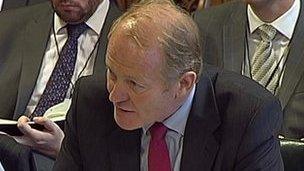Border Force boss defends suspension of customs checks
- Published

Sir Charles spent nearly 40 years in the Navy before becoming Border Force boss earlier this year
The UK's most senior immigration official has defended the suspension of customs checks on vehicles at Calais as necessary to protect national security.
It emerged last month that checks had been put on hold so officials could deal with queues at passport control.
Critics say efforts to tackle illegal immigration were effectively neglected.
But Border Force boss Sir Charles Montgomery told MPs a queue of vehicles was itself a security threat as it was vulnerable to "clandestine" migrants.
According to a National Audit Office report published last month, officers were ordered on three successive days to switch from searching for contraband and illegal stowaways to checking passports to prevent big queues building up at Calais and other entry points, ahead of last year's Olympic games.
'Clear rationale'
Freight searches were also suspended due to understaffing and to allow staff to have meal breaks, although vehicles continued to be searched by French officials and sniffer dogs used by the Border Force.
Sir Charles, a former senior Royal Navy officer who became Border Force boss in March, told the Public Accounts Committee that checks had not been totally abandoned.
But he said it was "absolutely right" to shift the resources at the Border Force's disposal where necessary to prioritise "traffic flows" at points of entry.
"There is a very clear rationale for this and it is driven by the primary objective of the Border Force which is national security. The flows of traffic approaching Calais are themselves important for security.
"The checks and controls can create backlogs of stationary traffic of up to three miles if not properly managed.
"Those queues are a primary source of security concern because stationary traffic - particularly soft-sided traffic - are a primary target for the clandestines trying to get through the border."
Labour MP Margaret Hodge, who chairs the cross-party committee, questioned why the decision had only come to light in the watchdog's report and why officials had not disclosed what was happening earlier.
The Border Force did "not want to put into the public domain the possibility or probability at any given time of checks having been suspended", Sir Charles said.
But Mrs Hodge replied: "If I may say so, it is not putting it in the public domain which is wrong, it is the action of suspending it which is wrong... it is the action, not the reporting of the action, which is vital."
Manpower
The National Audit Office has suggested a lack of manpower was to blame for resources having to be juggled.
The number of full-time border staff fell from 8,023 to 7,527 between April 2010 and March 2012.
But since separating from the Border Agency, the agency's budget has increased and funding is in place to increase staff numbers to 8,477 by next year.
The Border Force was brought under the direct control of the Home Office in 2011, when the UK Border Agency was abolished following a row over the relaxation of passport checks at Heathrow without the authorisation of ministers.
Sir Charles told MPs that coach parties of schoolchildren had been subject to less formal checks at Calais this summer under a pilot scheme to reduce delays, the results of which were now being evaluated.
The children had not been required to disembark and face-to-face checks had been carried out on the vehicle, he said.
He stressed the initiative had been pre-authorised by the Home Office and followed a risk-based analysis.
- Published9 October 2013
- Published4 September 2013